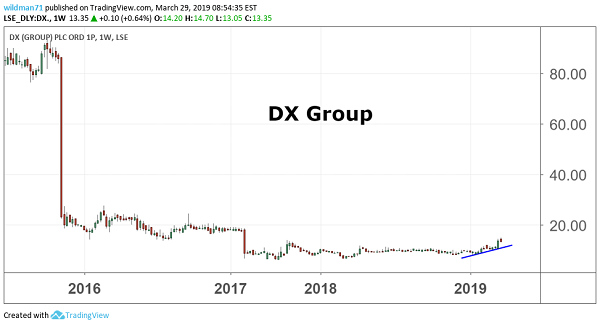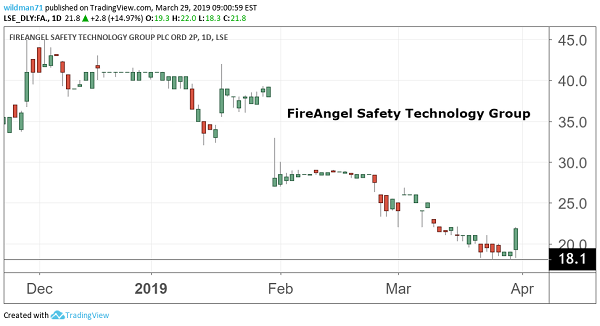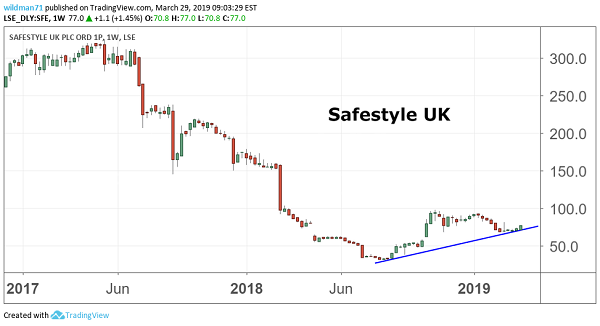Five AIM shares with great recovery potential
This handful of small-caps is good enough to bounce back, argues our former AIM writer of the year.
29th March 2019 15:25
by Andrew Hore from interactive investor
Life can be tough for smaller companies, but this handful have great recovery potential, argues this former AIM writer of the year.

There are many young companies on AIM that have never managed to achieve a profit, but there are other companies that have been highly profitable in the past and then slumped into loss.
Sometimes it is just a blip, but it can be a difficult task to return some of these businesses to profit and even more difficult to achieve the level of profit seen in the past.
Here are five potential recovery candidates. All are set to return to profit but it could be a hard slog to reach past levels.
DX (Group) (DX.)
13.5p
Parcel and mail delivery services provider DX (LSE:DX.) is an example of a business that was floated on AIM by private equity owners that cashed in immediately. That is always a concern, but it does not necessarily mean that they know that it is the time to get out. Some companies, such as kettle elements supplier Strix, have continued to prosper when their previous backer cashed in, but DX proved to be very different.
The freight division was the main problem. It was not getting the correct prices for parcels in terms of their weight and shape and it was not pushing enough business through its depots.
Activist investor Gatemore and other investors removed management and put in its own team. Chief executive Lloyd Dunn founded Nightfreight, which was listed in the 1990s and was acquired by DX in 2012.
He and executive chairman Ronald Series were involved in turning around Tuffnells Parcel Express.
Finance director David Mulligan had the same role at Hornby and Morgan Sindall.

Source: TradingView (*) Past performance is not a guide to future performance
Increased responsibility has been given to individual freight depots and new pricing structures put in place. There has also been a move towards B2B customers rather than business to consumer ones. Depots are being opened selectively and the hub at Willenhall reorganised. New vehicles are being ordered.
DX Express has continued to make a profit, but it has been declining. Pricing is being reviewed and there is a focus on improving service, which has already reduced the rate of loss of customers.
Management identified that investment in IT systems for the group was essential to make the business more efficient. This is a three-year investment programme so the full benefits will not show through in the short-term.
A small loss is expected in the year to June 2019, when net debt is expected to peak at £9 million, and then profit should start to be rebuilt. A pre-tax profit of £4.5 million on revenues of £327.8 million is forecast for 2019-20, rising to £7.5 million the following year when freight should make a small profit contribution. Back in 2014-15, pre-tax profit was £26.7 million on revenues of £297.5 million, indicating the potential margin improvement to come.
Once sorted out, this is a business that has enormous potential to increase its profit. However, it may take three or four years for that true potential to be realised. Longer-term, there should be a significant recovery in profit and the share price.
However, the delivery contract with the Passport Office is being retendered and there should be a decision in April. Whether or not DX retains the contract could have a significant effect on the short-term share price.
Autins Group (AUTG)
31p
Acoustic and thermal insulations products supplier Autins (LSE:AUTG) came to AIM with optimistic growth expectations. That meant that it built up its cost base in anticipation of the growing revenues.
Revenues have been growing but not fast enough to prevent the profit performance deteriorating because of the excessively high cost base. Last year's revenues were nearly 50% higher than three years before but the company slumped into loss.
Autins made an underlying loss of £900,00 in the year to September 2018, compared with profit of £1.6 million the year before. Annualised costs of £850,000 have been cut. Net debt was £4.2 million at the end of September 2018 after a rise in inventories.
The customer base is predominantly automotive. They use the company's insulation products to reduce vehicle noise and weight. This dependence has not helped given the weakness of the sector, but sales to the sector have been rising. Reduced demand from Jaguar Land Rover hit the second half of last year and the company is trying to diversify its customer base.
There are positives. Demand from the automotive sector is growing even if there are short-term problems. The newer Neptune product has increased its revenues and it is being trialled by potential users. Business is also increasing from the flooring and construction sectors.
Autins is expected to breakeven this year even after a decline in revenues. A £500,000 profit is forecast for 2019-20, which would put the shares on 13 times prospective 2019-20 earnings. Patience will be required given that the automotive sector is so important.
FireAngel Safety Technology Group (FA.)
21p
Home safety products supplier FireAngel (LSE:FA.) was a consistently profitable business when it was known as Sprue Aegis. It was quoted on what is now NEX Exchange for more than a decade before moving to AIM.
A dispute with BRK Brands, whose products Fire Angel used to distribute, took up management time and the termination agreement was costly. This meant that management did not pay enough attention to the business and selling the remaining BRK products at a discount in order to clear the stocks did not help. New supply agreements had to be put in place, and it took time for them to get up and running.
Last year, even before taking into account exceptional costs related to the termination agreement, there was a swing from an underlying pre-tax profit of £4.7 million to a loss of £2.1 million.
In the past year, the share price has fallen by more than four-fifths. A placing and 17-for-26 open offer at 20p a share – a premium to the previous day's closing price - will raise up to £6 million to reduce debt and provide working capital. The closing date of the open offer is 16 April.

Source: TradingView (*) Past performance is not a guide to future performance
Fire Angel needs to rebuild sales and the outlook is positive. There is a link up with Mears and a number of social housing deals have been signed. Legislation in Scotland means that homes will have to have smoke and carbon dioxide alarms. There is demand for the company's products and supply problems should have come to an end.
There could be a return to profit this year, but it will be modest. The main improvement will come next year as some of the contract wins build up revenues. Stockdale forecasts a 2020 pre-tax profit of £2.9 million and earnings per share of 3.6p, giving a 2020 prospective multiple of six. That makes the open offer shares look worth taking up.
Safestyle UK (SFE)
75p
Replacement windows and doors firm Safestyle (LSE:SFE) had been a highly profitable and cash generative business since flotation, offering an attractive yield to investors. However, the fragility of this type of business was highlighted when an executive left to start up a rival called SafeGlaze and agents followed. After litigation SafeGlaze was closed and agents have returned.
As in many of these cases, it was new management that came in and stabilised the business. They initially had to sort out the litigation, which was not cheap, and put the business on a firm footing. A 2017 underlying pre-tax profit of £15.1 million was turned into a loss of £8.7 million as revenues slumped from £158.6 million to £116.4 million.
Safestyle lost market share but it was still 8.2% last year. The next stage of the turnaround plan is to rebuild the workforce and grow revenues and profit. Safestyle is expected to return to profit this year based on the changes already made.

Source: TradingView (*) Past performance is not a guide to future performance
There is no doubt that good progress has been made since the new chief executive started last May. This is a business that can be highly cash generative in the good times. If Safestyle can achieve the 2020 pre-tax profit forecast of £7.8 million, the shares would be trading on 10 times prospective 2020 earnings. Given the uncertain economic conditions and risks, the share price fully reflects the shorter-term potential.
Brady (BRY)
57.5p
Brady (LSE:BRY) is a trading and risk management software company that had grown rapidly by acquisition, but the operations were not properly integrated. Non-core activities have been sold and management has concentrated on making the business more efficient and investing in its technology.
Brady has been losing money since 2015 and it has taken time to sort out the business. Last year, part of the focus was on completing projects and keeping existing customers happy. This will continue into 2019, but there will be more effort put in to acquiring new customers and packaging existing products to be more attractive to a wider customer base.
In 2018, revenues improved by 4% to £23.2 million and higher gross margin helped to reduce the pre-tax loss, excluding discontinued activities and exceptionals, from £4.4 million to £1.5 million. Recurring revenues were £16 million, so Brady has a strong base.
Investment in the business has continued. Brady capitalised nearly £3 million of investment in technology development, up from £2.5 million. There was cash of £4.63 million at the end of 2018.
Brady is set to make a profit of just over £1 million in 2019, but the shares would be trading on 29 times prospective earnings. The turnaround has taken longer than expected - back in 2017 Cenkos forecast a profit in 2018. Management has constructed a solid base for the business, and it needs to go out and generate revenues to prove it can achieve a realistic profit.
Andrew Hore is a freelance contributor and not a direct employee of interactive investor.
These articles are provided for information purposes only. Occasionally, an opinion about whether to buy or sell a specific investment may be provided by third parties. The content is not intended to be a personal recommendation to buy or sell any financial instrument or product, or to adopt any investment strategy as it is not provided based on an assessment of your investing knowledge and experience, your financial situation or your investment objectives. The value of your investments, and the income derived from them, may go down as well as up. You may not get back all the money that you invest. The investments referred to in this article may not be suitable for all investors, and if in doubt, an investor should seek advice from a qualified investment adviser.
Full performance can be found on the company or index summary page on the interactive investor website. Simply click on the company's or index name highlighted in the article.
Disclosure
We use a combination of fundamental and technical analysis in forming our view as to the valuation and prospects of an investment. Where relevant we have set out those particular matters we think are important in the above article, but further detail can be found here.
Please note that our article on this investment should not be considered to be a regular publication.
Details of all recommendations issued by ii during the previous 12-month period can be found here.
ii adheres to a strict code of conduct. Contributors may hold shares or have other interests in companies included in these portfolios, which could create a conflict of interests. Contributors intending to write about any financial instruments in which they have an interest are required to disclose such interest to ii and in the article itself. ii will at all times consider whether such interest impairs the objectivity of the recommendation.
In addition, individuals involved in the production of investment articles are subject to a personal account dealing restriction, which prevents them from placing a transaction in the specified instrument(s) for a period before and for five working days after such publication. This is to avoid personal interests conflicting with the interests of the recipients of those investment articles.